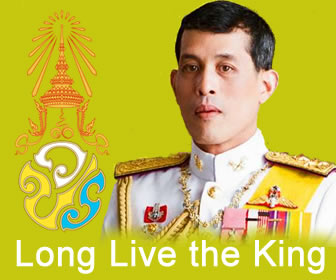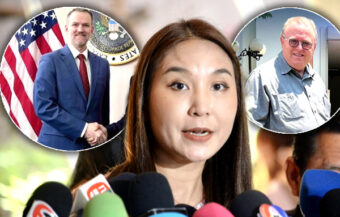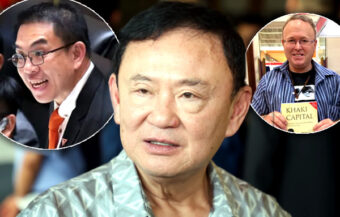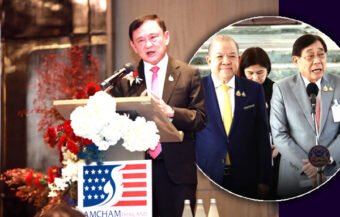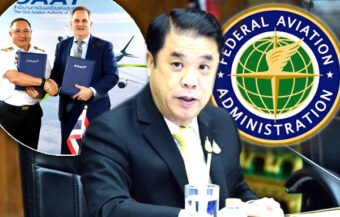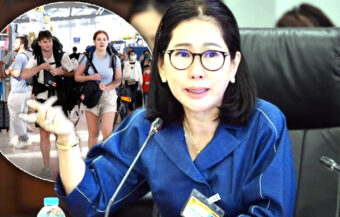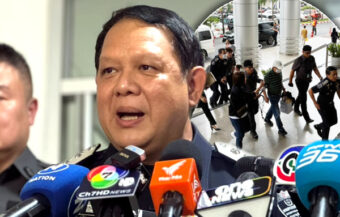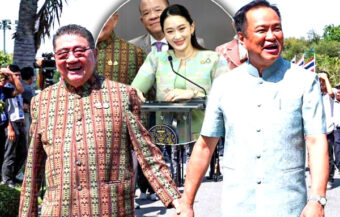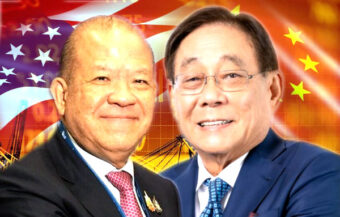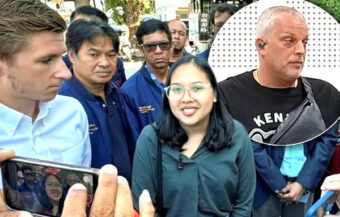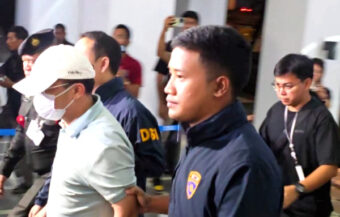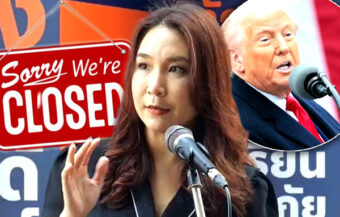Visit by Central Intelligence Agency’s Deputy Director David Cohen on Friday came the day after the Charge d’Affaires at the US Embassy highlighted and praised Thailand’s role as a more reliable trade and supply chain partner for American firms during the COVID-19 crisis, than neighbouring countries.
The United States, this week, signalled its intention to build a new framework of alliances in the Indo Pacific region to protect its supply chains targeting key allies which will include Thailand. The new pact will be launched formally in 2022 but was outlined by US Secretary for Commerce, Gina Raimondo, in Singapore on Wednesday on the same day as a new US-Japanese trade partnership was announced. The new emphasis from Washington on protecting supply chains comes as tensions with China in the region are rising.
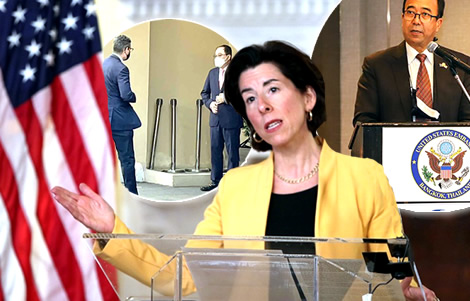
The Deputy Director of the Central Intelligence Agency, David Cohen had several high profile meetings in Bangkok on Friday including a 45-minute conference with Thai Prime Minister Prayut Chan ocha at the Thai Ku Fa Building at the heart of the Government complex.
The meeting was held under unusual secrecy with reporters being kept at a distance and both sides remaining tight-lipped as to the nature of the conference.
Meetings also with Deputy Prime Minister Prawit Wongsuwan and National Security Council boss
The meeting was described by government officials as unscheduled and also saw Mr Cohen engage in a consultation with Deputy Prime Minister Prawit Wongsuwan also at Government House for another 45 minutes before later meeting the Secretary-general of the National Security Council, General Supot Malaniyom, at the agency’s headquarters.
Suriyawongpaisal Ramathibodi, the Director of National Intelligence, also participated in the meeting with General Prawit.
As for the nature of the meeting, the deputy prime minister with responsibility for security matters, General Prawit, indicated to reporters that the briefing was linked to efforts by the new US Biden administration to familiarise itself with key regional security agencies.
He described the discussion as related to wider security matters.
Declined to answer speculation of a US warning to Thailand but indicated it was a discussion on security
Asked repeatedly by reporters to comment on speculation that the flurry of meetings had something to do with some specific US activity in the region or whether the top security official had conveyed a warning to Thailand, General Prawit demurred.
UK Foreign Secretary visits Bangkok after AUKUS security pact further raises tensions with China
The meetings occurred against the backdrop of rising tensions in the Asia Pacific after the United States, the United Kingdom and Australia unveiled its trilateral AUKUS defence pact in September.
These moves came as officials in Taiwan and the United States confirmed that US armed forces are active on the island in a training capacity.
Fears that a more belligerent China is poised to take military action in relation to Taiwanese independence
The move is seen as a response to a more belligerent China and fears the communist country is readying itself to take military action against Taiwan which has increasingly asserted its independence under its current leadership.
It is a popular stance on the island despite persistent and growing threats from Beijing.
A survey in Taiwan, in 2020, undertaken by the Taiwanese Public Opinion Foundation found that 54% supported formal independence from China while 23.4% prefered the status quo of de facto independence in all but name.
Only 12.5% of the population supported reunification with the Chinese mainland while 10% were undecided.
Taiwan’s President Tsai Ing-wen insists the island is already independent of China as experts warn of invasion or blockade before November 2024
The country’s veteran President 65-year-old Tsai Ing-wen, a former academic and leader of the Democratic Progress Party, Taiwan’s first female government leader and in her third term, has declared Taiwan as already independent, a tacit rejection of the 1992 consensus with China and the One China principle.
Ministers in Taiwan are openly expressing fears of a Chinese invasion of the island state.
Their concerns have been supported by security experts worldwide, particularly in the United States and Australia, who believe there is a strong possibility of either a Chinese invasion or blockade of Taiwan before the next US presidential election in 2024.
Credible fears of an armed conflict between 2023 and 2024 over Taiwan are growing not only in Australia
Thailand ceased to recognise Taiwan officially in 1975 but the island remains one of the largest investors in the kingdom.
US signals new trade framework for Indo Pacific will be unveiled in 2022 on a more formal basis
The briefing on Friday is also coming as US officials, this week, in Bangkok, Japan and at an international economic seminar in Singapore, signalled a new, more practical and hands-on trade policy for the region being developed by Washington.
Speaking at the Bloomberg New Economy Forum, Secretary of Commerce Gina Raimondo spoke of fostering stronger trade ties bilaterally with countries in the Indo Pacific region to strengthen America’s supply chain network as a more practical and viable means to foster security and economic development.
‘We’re likely to launch a more formal process at the beginning of next year which will culminate in a proper economic framework,’ Ms Raimondo said when she addressed the conference after Chinese Vice President Wang Qishan spoke via a video link from Beijing.
Mr Wang told the body that China could not ‘develop in isolation from the world and nor can the world develop without China’.
New US Japanese trade pact announced
Ms Raimondo, a former Rhode Island governor, had just arrived in the city-state after a visit to Japan while US trade representative Katherine Tai, remained in Tokyo where, on Wednesday, she announced a new US-Japanese partnership on trade which is thought to be linked to the new US approach.
Ms Tai is also due in South Korea and India which has long been targeted by the United States for improved trade ties.
Indian Prime Minister Narendra Modi withdrew his country from the Regional Comprehensive Economic Partnership (RCEP) trade pact in November 2020 in Bangkok.
Thailand to be part of the world’s largest free trade pact including China from January 1st next year
The new trade agreement, the largest in the world but lately seen as China-centric, will go into effect in January with both China and Thailand taking part. It will represent 30% of the world’s GDP.
Thailand is understood to be prepared to apply to join the rival multilateral but more demanding and conditional Comprehensive and Progressive Agreement for Trans-Pacific Partnership (CPTPP) after China applied to join the pact in September following the United Kingdom which put itself forward in May.
More ambitious CPTPP pact would take it further but it may be a step too far for Thailand right now
However, that trade pact poses severe challenges to Thailand in much the same ways as it was ultimately rejected by the United States as a direct threat to blue-collar jobs and workers livelihoods, a political group stateside that President Biden will have to work hard to bring back to the fold of the Democratic Party after being swayed by Trump’s trade policies.
United States following the Trumpian policy of aversion to multilateral trade pacts and will pursue bilateral agreements within a framework
The United States is thought to be politically against multilateral trade agreements with the policy of bilateral agreements initiated by US President Donald Trump being now adopted by the Biden administration.
On Wednesday, in Singapore, the US Commerce Secretary spoke of a formal arrangement with countries in the Indo Pacific region being negotiated next year.
She agreed with a reporter’s characterisation of the trade alliance as a ‘coalition of democracies’ to improve trade relationships and performance.
Ms Raimondo stressed that the goal of this arrangement was to secure America’s supply chains in the region. She emphasised that the new American approach to trade which will be unveiled in 2022 is not about China.
‘I will say this, China is going to do what China is going to do, and whether or not the current members of CPTPP allow China to come in, that will be as it will be,’ she explained. ‘This is about developing robust commercial and economic relationships with our partners in the Indo-Pacific where we have had robust relationships for a long time.’
She promised that a more formal basis for what America was proposing will emerge in 2022.
‘We’re likely to launch a more formal process at the beginning of next year which will culminate in a proper economic framework.’
US Charge d’Affaires in Bangkok on Thursday spoke of Thailand as a more reliable supply chain partner than neighbouring countries in the region
The comments by the US Commerce Secretary were reinforced by the Charge d’Affaires at the US Embassy in Bangkok, Michael Heath, on Thursday as he addressed the Thai Journalists Association at a seminar held for reporters at the mission on Wireless Road in the city.
At the event, he pledged US support for a free, open and stable Indo Pacific.
‘As a Pacific nation, the United States is committed to a free and open Indo-Pacific because a free and open architecture benefits both the American people and the peoples of all other Pacific nations,’ he declared. ‘As Admiral Aquilino, the commander of US Indo-Pacific Command, said during his recent visit to Thailand, the United States is committed to ensuring peace, prosperity, and stability for all countries in the region.’
Then Mr Heath appeared to turn to the new diplomatic initiative by the United States to forge an alliance and strengthen ties with players in the region including Thailand, the Philippines, South Korea, Japan, India and Australia.
He particularly cited and praised the success of Thailand’s export sector in supplying the US with badly needed supplies during the COVID-19 crisis.
The senior US diplomat pointed out that the United States is the kingdom’s largest export market and that Thai firms managed to uphold their commitments to US supply chains, unlike other neighbouring countries.
Join the Thai News forum, follow Thai Examiner on Facebook here
Receive all our stories as they come out on Telegram here
Follow Thai Examiner here
Further reading:
UK Foreign Secretary visits Bangkok after AUKUS security pact further raises tensions with China
Trade pact with Hong Kong as Thailand negotiates both Chinese and new western trade relationships
US Ambassador resigns as Biden Presidency starts with growing tensions with China over Taiwan
RCEP deal agreed as India opts out – busy Bangkok ASEAN summit concludes on a low key
Chinese FM to visit Thailand in a Covid battered world of raised tensions and potential conflict
Prime Minister indicates that the cabinet reshuffle will be complete very shortly with no problem
Thailand’s economy has become dependent on government expenditure to stay above water
Thailand and US aim for a new more ‘proactive’ trading relationship as ambassador meets Prayuth
Rice price spike but drought conditions to recede – security concern for the Mekong river
US suspension of Thai preferential trade partner status part of Trump’s ongoing trade war

